What is the legal profession’s role in preventing climate catastrophe? Eduardo Reyes reports from the Gazette’s latest roundtable
At the table (on screen)
Top row (l-r): Lee Shankland-Gort, Addleshaw Goddard; Becky Clissmann, The Chancery Lane Project; Alexander Rhodes, Mishcon de Reya
Middle row (l-r): Maria Connolly, TLT; Matthew Gingell, Oxygen House Group; Caroline May, Norton Rose Fulbright
Bottom row (l-r): Nigel Brook, Clyde & Co; Edward Bridge, Zurich Insurance; James Darbyshire, Financial Services Compensation Scheme
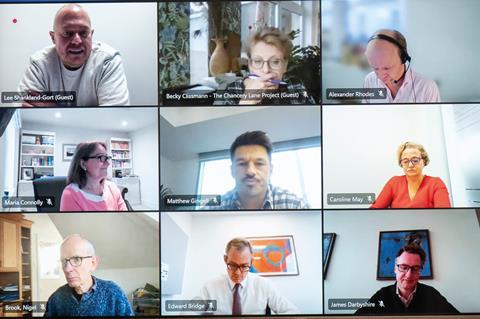
Matthew Gingell describes the Chancery Lane Project (TCLP), of which he is both founder and chair, as ‘the biggest and boldest collaboration of lawyers working around the world, pro bono, to deliver climate solutions through contracts’. The project’s concern is the creation and promotion of precedent clauses openly available for use by all, for free – a line-by-line effort to build the fight against catastrophic climate change in the fabric of the agreements that govern our business dealings.
As general counsel at Oxygen House Group, Gingell also speaks with the authority of a business client, and fellow in-house lawyers are among those most prominent lawyers promoting TCLP’s work. As he points out, that work has an urgency to it.
‘Net zero only works if we all get there,’ he says. From the day the roundtable meets, he notes: ‘There are 2,591 days until 2030, by which we have to cut emissions in half.’ He adds a relatable metric for a legal audience: ‘For law firms, that’s fourteen partner conferences or 10,625 billable hours. That is a big order. That’s going to require every professional in every business around the world to make a difference, including lawyers.’ The legal and legislative timetable eats in to such time, he adds: ‘It took 782 days to bring the Friends of the Earth versus Shell case through the Dutch courts, and that’s now in appeal. And it took 685 days to enact the Environment Bill, so laws and climate litigation aren’t exactly going fast.’
The record
How well has the legal sector done to date? It has a mixed record, Wedlake Bell partner Helen Garthwaite notes: ‘I think if I roll back 20 years… my perception is that the awareness of sustainability and environmental challenges has increased. More so in certain sectors than others.’
Garthwaite, whose practice is in commercial property, says: ‘The bigger corporates [and] the financing side of the industry are driving awareness in their practitioners and their general counsel.’ Action and awareness lag at ‘the consumer end of the industry’, she adds, although high energy costs and extreme weather events have given greater prominence to the climate crisis for all.
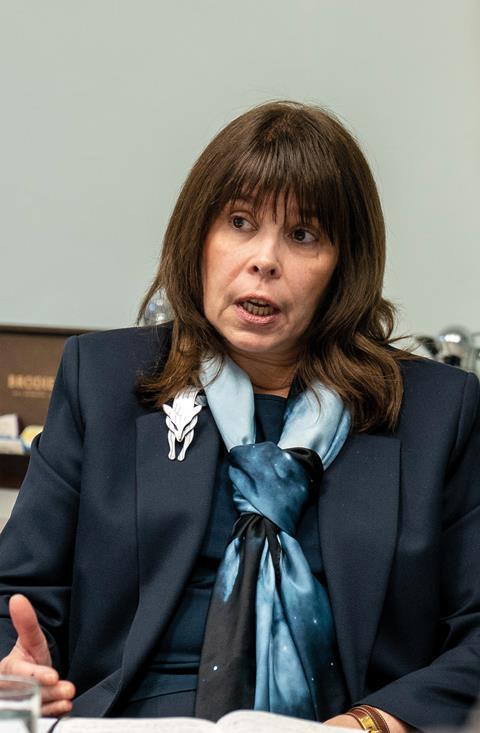
‘When I started out… there was no legal framework, there was nothing called the Environmental Protection Act,’ Norton Rose Fulbright partner Caroline May, who chairs the Law Society’s climate change working group, recalls. The focus of environmental law then was pollution and the risks attached to pollution – ‘toxic torts, land contamination’.
The 1990 Environmental Protection Act did cover waste management, but significantly also defined and addressed the control of emissions into the environment. What has followed since has included the 2016 Paris Climate Accords and attendant legislation.
May says: ‘Capital now looking to invest in green projects has really brought this away purely from the risk side into the mainstream. It’s a mainstream corporate issue now, both from a liability perspective and an opportunity perspective.’ Therefore, she says: ‘The role of lawyers has expanded exponentially. I’ve gone from being the strange lady in the corner who seemed to be concerned about habitats to somebody mainstream, advising commercial clients, banks and financial institutions on the impact of all the new regulations and the direction of travel. We’re a global law firm,’ she adds, ‘and I know attitudes change around the world to this subject, and ESG in particular has been a big boom area for advisers.’
Greenwashing
The charge levelled against big business is that many major companies are engaged in ‘greenwashing’. The accusation is that many have statements on environmental action that use misleading language and inconsistent standards to conceal the true picture.
Ed Bridge, UK general counsel for Zurich Insurance, says lawyers’ role in governance is important here. ‘General counsels are typically responsible for the governance in their organisation… identifying who’s responsible for ESG, for climate change, and for making sure it’s appropriately measured, [that] there’s the right management information, people are held to account, that the board is exercising proper oversight,’ he says. ‘That’s a pretty key part of helping big corporates pivot, but it requires significant support from private practice lawyers.’
Here there is work to be done, Bridge says: ‘I think to date, from what I’ve seen, most private practice law firms have an ESG offering. [But] it’s pretty limited and, to be honest, because it’s such a developing area it very rarely gets to the qualitative level of expertise that you would need to drive meaningful change.’ That will come, he believes, ‘in part through more prescriptive international standards and more regulation’, meaning it will ‘become easier… for law firms to support [clients]’.
The legal sector has much to do, Mishcon de Reya partner Alexander Rhodes continues. ‘I think we haven’t made the case at all well or powerfully as to why the law is important and how it can be used,’ is his assessment. ‘I think that moving from “legal says no” to “legal says yes” has to be a really big part of that.’
As head of the firm’s Mishcon Purpose practice, Rhodes promotes the view that ‘the law is actually part of the systems… we’re a really fundamental part of the systems that need to change’.
Defining issue
Greenwashing is, in part, enabled by the absence of standardised and recognised measures and language. ‘There is a very wide range of benchmarks and ratings,’ Garthwaite says, meaning ‘there’s a huge difficulty in comparables’.
On this, May notes: ‘In the financial sector… we’ve got the [Financial Conduct Authority] bringing out sustainability reporting and labelling guidelines, [and] we’ve got the development of taxonomies.’ The development of reporting standards ‘in other areas and the acceptance of taxonomies’, will help, she predicts.
That, Bridge says, will empower lawyers as professionals. This is because greenwashing ‘does fundamentally come down to some kind of misrepresentation about what you’re doing. It’s about doing your job,’ he says, ‘and protecting the reputation of who you work for or who you represent to stop misleading representations being made about what is happening.’
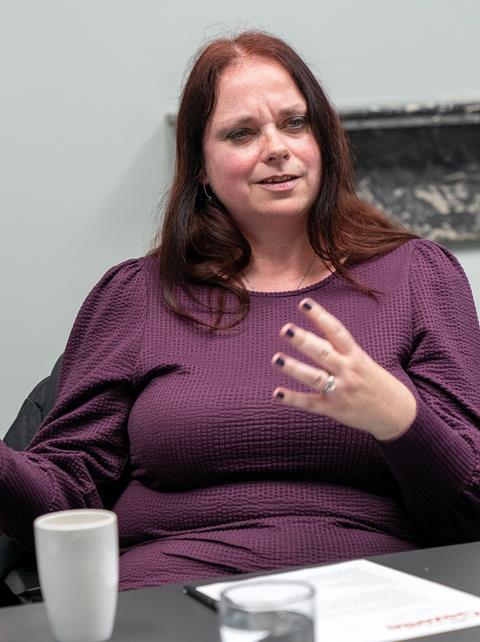
To take such opportunities, though, the legal profession needs to raise its game. Bridge says that as trusted advisers on climate change, lawyers are lagging behind other professionals.
‘Being realistic, the consultants have stolen a march,’ he adds. ‘This is a big growing business in which the legal sector has potentially a lot to offer. But we should be realistic that… the Big Four and consultancy firms are garnering expertise and knowhow in a way that so far the legal sector just can’t compete with. You just need to be realistic about that and then work out: how the sector can be relevant going forward and make its mark.’
TCLP’s managing director Becky Clissmann says: ‘My experience working with The Chancery Lane Project is that while there are certainly some leaders… the vast majority of the profession has not really got to grips with what it takes to transition, or for the sector to help clients to transition to a low carbon or decarbonised economy.’
The position lawyers need to be in, she suggests, is to understand: in the context of climate change, ‘what does it mean to advise your client properly?’. She continues: ‘Do you understand your client’s business from a climate perspective and the climate risk perspective in the way that you understand the financial aspects of their business?’ On transactions, she adds: ‘What questions are you asking in terms of climate?’
Such an approach should focus on issues such as how to shape a ‘just transition’. This refers to the way the Paris Agreement sets out the transition to be made from high-carbon activities to the green economy, without harming workers in polluting industries. TCLP published a suite of ‘just transition’ documents in October, Clissmann notes.
Hot air? Holding law to account
The legal sector is, by some measures, a £60bn industry in the UK alone. It needs to play its part in reducing emissions. And like any major sector of the economy, its businesses include firms who are open to the accusation of ‘greenwashing’.
Clients and potential recruits frequently interrogate law firms on their record here. So how is the profession performing, and what is holding it to account?
Maria Connolly, TLT’s national head of real estate and clean energy, says: ‘It’s not so much, is it, about the law firm’s own direct carbon footprint?’
She refers to the Greenhouse Gas Protocol, which sets out Scopes 1, 2 and 3 for the purposes of carbon footprint reporting (90% of Fortune 500 companies use this method). Scope 1 is the direct production of carbon; Scope 2 covers the purchase of energy; and Scope 3 covers the impact from other parts of a business’s supply chain.
‘For most law firms,’ she says, ‘probably 94% of carbon footprint is in Scopes 2 and 3, [with] a very small but important amount in Scope 1. So it’s about supply chain.’ As a result, she says: ‘Scope 2 and Scope 3 activities are a real focus to really make that difference and bring that 94% down to a much, much better number.’
There is pressure from clients for firms to clearly report on climate impact. It is a point raised in tenders. ‘It’s partly a hygiene factor that drives culture,’ Zurich Insurance’s UK general counsel Ed Bridge says.
Centrica’s associate general counsel Nichola Westlake says the company has ‘a big focus’ on supply chain due diligence.
James Darbyshire, chief counsel at the Financial Services Compensation Scheme, says in a recent tender exercise, the point was pushed further. One question to firms was: ‘How have you considered the environmental impact of your clients’ activities?’
He relates: ‘It was quite interesting to see the range of responses that you got to that question, and in fact sometimes you didn’t really get an answer at all… One interesting [answer] was the concept of an ethical vetting committee being set up for that purpose.’ He adds: ‘I think that is a direction of travel that clients will increasingly go down.’
When to act
With Russia’s invasion of Ukraine, many international law firms quickly took the decision to cease acting for Russian clients, even if those clients were not directly sanctioned. Such divestment met a public and political expectation.
Should lawyers refuse work that impacts the climate negatively? Linklaters partner Richard Godden says law firms need ‘to have regard to a range of factors’ when it comes to client and matter acceptance. He gives the example of a client where, ‘you suddenly discover they’ve got non-transparent ownership; they seem to have a pretty dodgy employment record; they don’t seem to be at all clear about their position on environmental issues’.
As a result, he says: ‘You look at it all and you think, “Have you rejected them for environmental issues?” Actually, you’ve just looked at them and you’ve just thought, “I don’t want to act for these guys.” So, I think it’s all tied together, and it seems to me, clearly, any responsible law firm now is going to take account of all these issues [to decide] which people they’re prepared to act for, and certainly we do.’
'If either a client or matter is not consistent with the move towards meeting Paris goals, for example, then clearly taking it on needs some justification'
Richard Godden, Linklaters
Godden says guidelines can be helpful, but ‘red lines are not the way to go. It may make you feel better, but I don’t think it’s going to improve your decision-making’. On environmental considerations, he says: ‘If either a client or matter is not consistent with the move towards meeting Paris goals, for example, then clearly taking it on needs some justification.’ That may include a socio-economic justification, he notes.
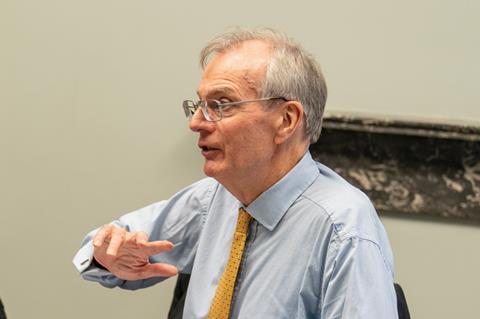
‘It is a transition period,’ Garthwaite points out. ‘I think the rule of law and the right to representation is important. So, the profession needs to get a balance on that, recognising there’s a transition period for this and not limit expertise where that expertise exists.’
That logic would seem to point towards the Paris Agreement’s ‘just transition’ principle. A law firm might ask whether, although a client is in a polluting industry, does the matter at hand assist with its transition?
'We’ve got a board who are really engaged in this and they’re holding themselves accountable'
Nichola Westlake, Centrica
Centrica, owner of British Gas, is represented at the discussion by its associate general counsel Nichola Westlake. ‘I work for a company which at the moment contributes and in a more negative way but has a sincere focus on changing that,’ she says, ‘and it is very exciting in some of the terms of where it’s going, what it’s doing. We’ve got a board who are really engaged in this and they’re holding themselves accountable… we want to be net zero by 2050.’
Senior consultant David Hunter’s firm Bates Wells is a ‘purpose-driven business’. In that context, he observes: ‘I think more and more firms are acknowledging that our biggest potential influence is with our clients and helping them transition.’ Serving that purpose, he says, could mean ‘prioritising potential clients who are genuinely engaging on those journeys’, which ‘is potentially where you are optimising your ambition and wanting to have the greatest impact on what’s coming down the line’.
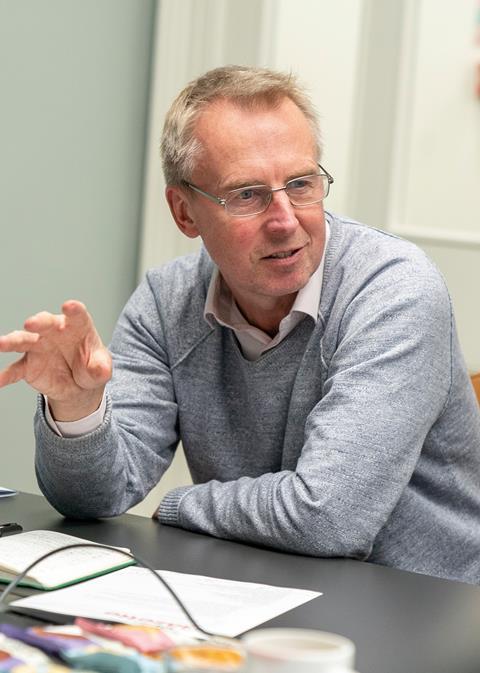
Clissmann asks if enough is done to alter the culture at every level of law firms. Could some of law’s traditional incentives be applied and adjusted here? ‘People have talked a lot about the governance aspect and the fact that boards are holding people to account,’ she says. ‘But how is that flowing down to the individual advisers? What does that mean for junior or perhaps senior associate lawyers? What KPIs do they have in terms of making the targets for the firm and their clients’ targets take effect? I have yet to hear anyone has really set targets like that.’
Getting there
Can entire industries reach net zero and keep the global temperature rise to 1.5 degrees without a professional contribution from the legal sector? It may sound self-important for lawyers to answer ‘possibly not’. Yet accountability, reporting and governance emerge as central themes of huge importance in efforts to avert climate catastrophe.
‘In terms of the wider question, “Will we get to net zero?”, the heart says, “We’ve got to”,’ Lee Shankland-Gort, Addleshaw Goddard’s head of social, sustainable and green finance, says. There is a major focus on ESG, he points out, on which he observes: ‘The philosophy behind ESG, I guess, is that stakeholders step in when intergovernmental cooperation doesn’t work. And so I’m worried, for instance, what happens with the US elections coming up in a couple of years’ time and that wider impact. And there’s only so much that we can do as a profession. There’s only so much we can do in this country.’
As a result, he concludes: ‘My heart says, “We’ve got to get there”. But my head is a bit less certain at the moment.’
- The Law Society will publish professional conduct guidance on matters related to climate change in early 2023
Image credit: Noah Da Costa























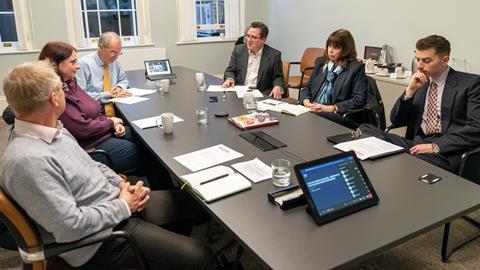













6 Readers' comments